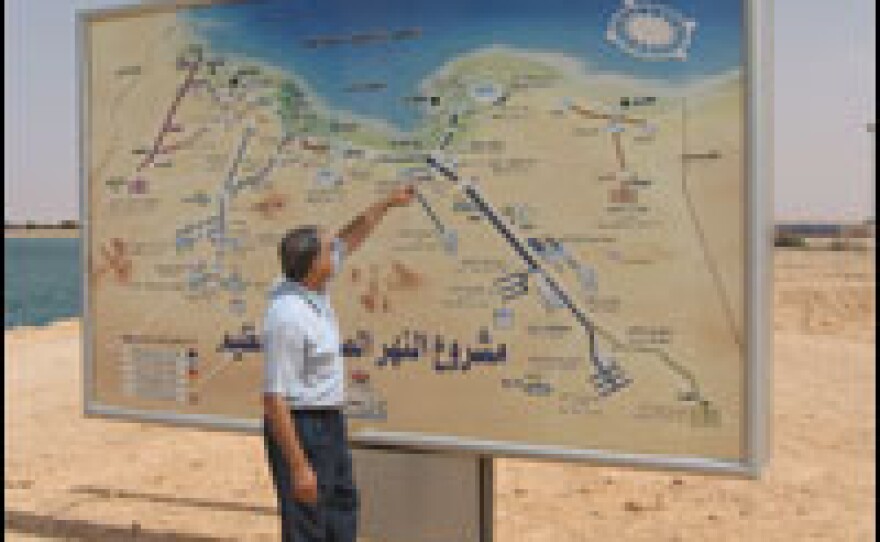
Libya has vast oil deposits, but this North African country has long suffered from a shortage of fresh water. That is until scientists discovered water in the most unlikely of places — the Sahara Desert.
For the past quarter century, Libya has been constructing a massive public works project with a most unusual name — the Great Man-Made River Project.
"It's the dream of all Libyans," said Dr. Ali Al Agab, one of the project's managers. "All Libyans have participated and paid from their pockets to execute this project for very good reasons."
Decades ago, Libyan officials realized there wasn't enough fresh water to meet the demands of the growing population, which is concentrated along a narrow strip of the Mediterranean coast.
While digging for oil in southern Libya, prospectors discovered water in the last place you'd expect on Earth — deep below the Sahara Desert.
Saad Al Ghariani, a professor of water sciences in Tripoli, explained the origin of the discovered water.
"Twenty thousand years ago there were heavy rainy episodes in the desert in the Sahara. The Sahara was not always the Sahara like this," Al Ghariani said.
Ghariani sports a long gray beard and a black beret, attire inspired by a meeting with Che Guevara in the 1960's. He said the water in the Sahara presented Libya's leader Moammar Gadhafi with a dilemma.
"They faced a very interesting question of whether to take people to water or bring water to people," Ghariani said.
Libya's solution was to pump water to the people. Fueled by Gadhafi's revolutionary rhetoric and by billions of dollars in oil revenues, the project was launched on a monumental scale in 1984.
A sample stretch of pipeline from the Great Man-Made River Project is more then 12 feet high and 12 feet wide. A truck could drive through the pipe. Pipe has been laid for hundreds and hundreds of miles through the Sahara Desert and it carries water from under the desert to Libya's coastal cities.
It took more than a decade to finish the first phases of the project. But today, every time you turn on a faucet in the major coastal cities of Tripoli, Benghazi or Sirte, you're getting water that's been pumped some 400 miles from under the Sahara.
The man-made river continues to grow. Last month, the Libyans opened the taps and began filling the Grand Omar Mukhtar Reservoir, said to be the world's second largest reservoir of its kind.
This massive man-made lake is more than a half mile in diameter with concrete walls more than 100 feet high. The reservoir overlooks brown, arid plains, where dust storms reduce visibility to less than 50 feet. But also in these plains new, irrigated fields of corn sway in the wind.
Agab said in coming years, the reservoir will be used to help irrigate tens of thousands of acres of new farmland.
"We are fighting back the desertification and we are transforming this to a green agricultural development," Agab said.
It's an ambitious and somewhat idealistic plan, but questions arise on whether or not the Sahara Desert's water supply will run out.
"Run out, no," Agab said. "At least for now they plan for 50 years for the economy of the project. All of the analysis is done for 50 years. Either the life expectancy of the pipe network, or the water resources there, is capable to go that far."
Skeptics have heaped criticism on the man-made river, which, according to one informed expert, cost at least $18 billion to build. Over the years, it was labeled everything from a ridiculous vanity project — which may lose as much as 30 percent of it water due to evaporation — to a possible cover for covert Libyan military activities.
The government of Gadhafi's vigorously denies these charges. It continues to call its man-made river the eighth wonder of the world.
Copyright 2022 NPR. To see more, visit https://www.npr.org. 9(MDAzMjM2NDYzMDEyMzc1Njk5NjAxNzY3OQ001))







